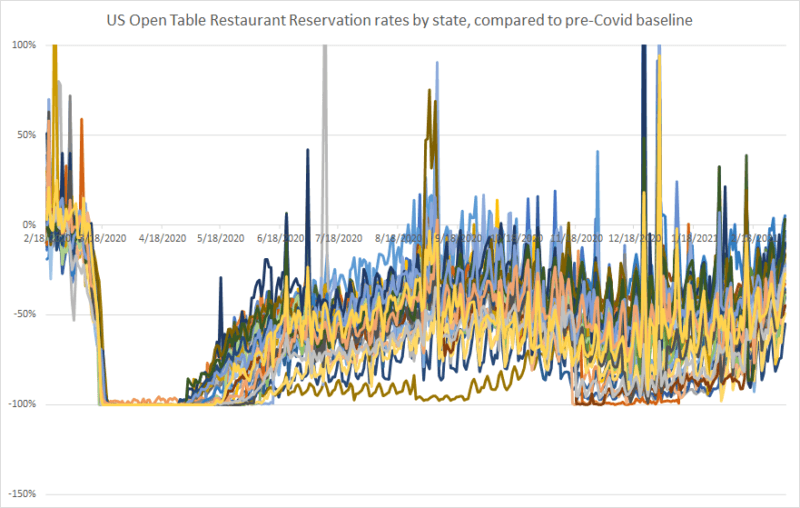“We cannot speak honestly about the astronomical costs of lockdowns
until our mainstream media outlets at least begin to speak the word.
They need to acknowledge the existence of the most devastating policy
decision in many lifetimes, a use of government power we never imagined
possible and one with catastrophic effects.” ~ Jeffrey Tucker
 Jeffrey A. Tucker
– March 9, 2021 @ American Institute for Economic Research
Jeffrey A. Tucker
– March 9, 2021 @ American Institute for Economic Research
 Daniela Lamas, a critical care doctor at Brigham and Women’s Hospital, has written a terrifying article in the Washington Post.
It’s about the non-Covid cases of sickness in her hospital. There are
older Americans dying of malnutrition, young men drinking themselves to
death, others with cancers that could have been treated had they not
skipped medical services for a full year, and drug overdoses breaking
all records.
Daniela Lamas, a critical care doctor at Brigham and Women’s Hospital, has written a terrifying article in the Washington Post.
It’s about the non-Covid cases of sickness in her hospital. There are
older Americans dying of malnutrition, young men drinking themselves to
death, others with cancers that could have been treated had they not
skipped medical services for a full year, and drug overdoses breaking
all records.
The article is a wake-up call for those who have thus far refused to recognize that there is more to public health than the avoidance of the pathogen with the name SARS-CoV-2. Good public health deals with the whole range of threats to human well being. As the epidemiologist Martin Kulldorff has stated, “[p]ublic health is about all health outcomes, not just a single disease like Covid-19. It is important to also consider harms from public health measures.”
There is just one problem with the piece: it never specifically blames lockdowns, even though the author details all the devastating consequences of these policies. She is almost too careful in her explanation:
Though we have always known that the cost of this pandemic would be greater than the number of the dead, we are only beginning to understand its true magnitude. In what might be a final wave of this pandemic, we find ourselves treating patients who have avoided the virus only to succumb to its many unintended consequences — addiction, untreated disease and despair.
It wasn’t the pandemic that caused this single-minded focus. It was government-imposed measures enacted in response to the pandemic. She surely knows that. A pathogen alone with such a narrow demographic impact cannot cause such devastation in so many. It’s the “nonpharmaceutical interventions” – there are many euphemisms – that locked people out of their workplaces, schools, hospitals, and churches, wrecking life for billions of people worldwide.
“The long shadow of this disease is everywhere,” she writes. It’s a long shadow all right, but the shadow belongs to government policy mainly, and, partially, the public panic fueled by media hysteria that led people to acquiesce to massive violations of their rights and freedoms.
This article is just one example among many thousands of lockdown denialism.
Why do major media outlets continue to engage in this wiley rhetorical game?
Consider these headlines:
- Pandemic caused changes, disruptions for drug treatment programs, specialty courts
- WHO says pandemic has caused more ‘mass trauma’ than WWII
- Pandemic caused $220 billion of global dividend cuts in 2020, research says
- Pandemic caused ‘staggering’ economic, human impact in global south, study says
- Pandemic caused 10% drop in community college enrollment
- Pandemic caused dramatic job losses
- Covid-19 pandemic caused alarming rise in mental illnesses across globe, say experts
- Pandemic caused worst year for US economy since 1946
- Has the pandemic caused a crisis in child care?
- How the Pandemic Can Trigger Depression
- The Lost Year: What the Pandemic Cost Teenagers
Plus thousands more. The world’s most conspicuous offender is of course the New York Times, which releases several articles per day that carefully avoid naming the true culprit, with analyses such as this:
Research has shown that some of the disproportionate impact on women was driven by the need to care for children during the pandemic, a circumstance that is often not captured in the official unemployment rate, which accounts only for people actively seeking work.
The data in the article are solid. The problem is the causal inference. It’s always the pandemic – and yes it is true that the lockdowns happened “during the pandemic” – and never the forced closures, even though we have plenty of data from open vs closed states to prove that the whole of the economic/social/medical impact is accounted for not by the existence of a germ but by government’s brutal treatment of people and their rights.
Ezra Klein deploys what is now the very predictable trope here, where he worries about:
what the coronavirus has done to children — whether this year will be a trauma that marks a generation, and remakes their lives. How has it changed socialization for toddlers — like my 2-year-old son? What has it meant for children who can’t go to school, who watched their parents lose work or who had family members die alone in a hospital? How do we help them? How do we even understand what they’ve gone through, particularly when they can’t tell us?
Do I really need to point out that the risk of severe outcomes from the virus to children approaches zero? Surely everyone knows that by now. The childhood trauma is shocking to consider but it’s not the coronavirus’s doing. It was the shutdowns of schools, the mandatory isolation, the forced masking, the persistent messaging that they and their fellow kids are nothing more than disease vectors.
In other words, it’s the lockdowns. Why not say so? Why the taboo?
Another Times writer, David Gruski, penned this tortured sentence: “For far too many American workers, the pandemic has delivered a one-two punch of hardship.”
It’s a preposterous claim on the face of it: 80% of the deaths associated with Covid are people over 65; below the age of 70, the chance of death from infection is 0.05%. One might expect that this would be public knowledge by now. It is not the virus delivering the one-two punch. It is government policy. It feels silly having to point this out but one has to when the best and brightest of our reporters so carefully avoid the point.
The avoidance of this reality cannot be an accident. In another illogical and gigantic piece for the Washington Post, the reporter pretends as if the lockdowns were a fait accompli, even though nothing like this has ever happened before.
“That virus, later named SARS-CoV-2, would slowly reveal its secrets — and proceed to shut down much of the planet,” says the team of reporters, studiously avoiding the obvious fact that a pathogen has no enforcement power of its own. It carries no guns, enforces no edicts, padlocks no school or business, and issues no stay-home order. It’s the lockdown that does that and the economic consequences were devastating.
My colleague Phil Magness has gone to great lengths to demonstrate this repeatedly. He looked at mobility data and economic performance in what amounts to a controlled experiment in locked down vs. not locked down states. He used reliable data on restaurant reservations to show that after an initial panic lasting a few weeks in March and April, the states that opened up crawled back to normal while those that imposed and retained restrictions did not.

It’s so obvious that it should not have to be said but by August, open states had far better economic outcomes than closed states. It’s also why we are seeing a huge migration from closed states to open states.
The pattern here is far too pronounced to avoid causal inference. Shutting things down causes things to shut down. As for how that affected disease outcomes, AIER has documented fully 31 studies showing that nothing governments did to control this virus had any measurable impact.
Nor are lockdowns a necessary or inevitable means reducing coronavirus deaths. There is now incontrovertible evidence demonstrating that states and nations that locked down fared no better in terms of reducing coronavirus cases, hospitalizations, and deaths, than those that did not impose government mandated shutdowns.
And yet we cannot even speak honestly about the astronomical costs of lockdowns until our mainstream media outlets at least begin to speak the word. They need to acknowledge the existence of the most devastating policy decision in many lifetimes, a use of government power we never imagined possible and one with catastrophic effects.
Could it be that they do not want to acknowledge that lockdowns failed because so many pushed them for a large part of 2020 and now want to avoid responsibility? Admitting error is hard. Or maybe there is an easier answer. Recognizing and naming the lockdowns draws attention to a terrible reality: all of this was preventable. It’s almost too difficult to accept.
And with that comes an unwillingness to recognize that there is a huge revolt against lockdowns brewing in this country. It’s not crazy people who resent having been stripped of their rights. It’s regular people coast to coast. The trust in public health authorities is collapsing minute by minute. It can be seen in the reluctance of large swaths of the population to take the vaccine.
Regardless, journalists for mainstream outlets cannot make that reality disappear by continuing to pretend – as they have for most of the last 10 months – that the lockdowns never happened. Americans are realizing that lockdowns were pointless, unnecessary, and destructive. Those who hold positions of authority in politics in the media, and who have engaged in lockdown denialism for the past 12 months will soon face a reckoning.

No comments:
Post a Comment